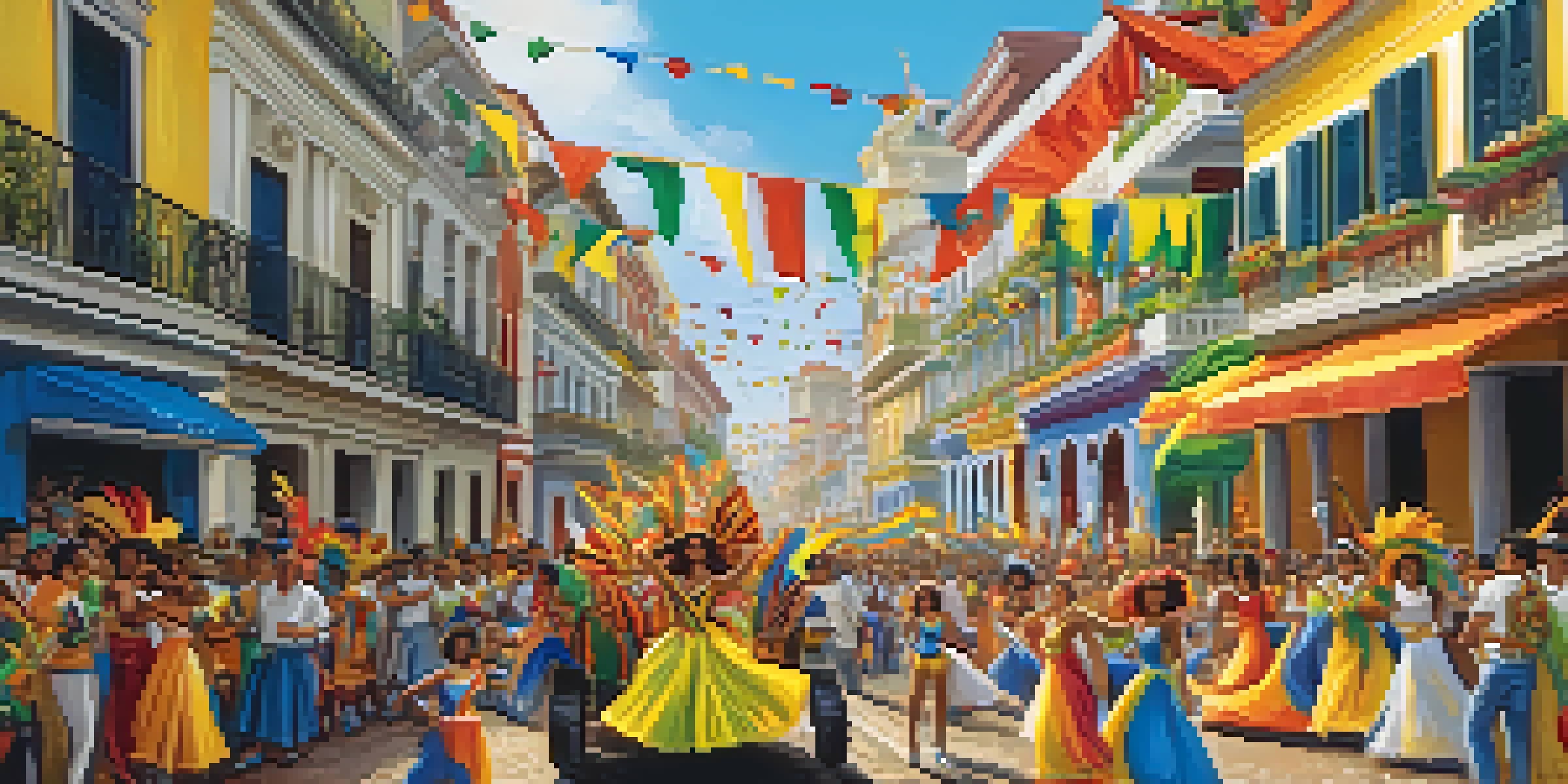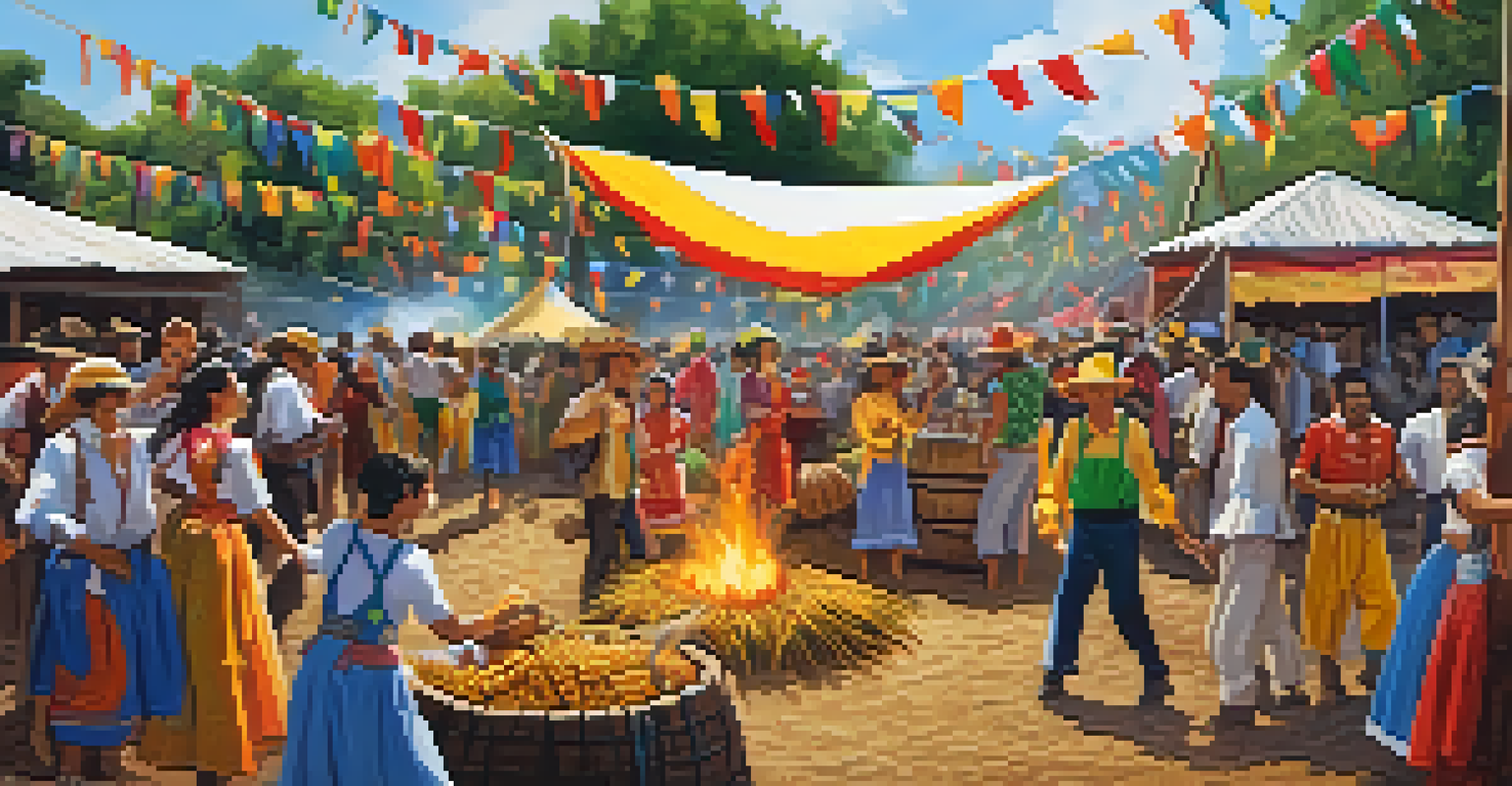The Impact of Colonial History on Brazil's National Identity

Understanding Brazil's Colonial Beginnings
Brazil's history as a colony began in the early 1500s when Portuguese explorers arrived. This marked the start of significant cultural exchanges and conflicts. The colonial period lasted for over three centuries, deeply influencing Brazil's social, political, and economic structures. Understanding these beginnings is crucial to grasp how they laid the groundwork for Brazil's diverse identity today.
Brazil is a country of many cultures, and each of them has contributed to the identity that we have today.
The arrival of the Portuguese brought not just settlers but also a system of exploitation that included the enslavement of Indigenous peoples and later Africans. This created a complex tapestry of cultures, languages, and traditions that intermixed over time. The impact of colonization still echoes in Brazil's social fabric, making it a unique blend of influences.
Colonial history set the stage for a society that values both diversity and complexity. From the start, Brazil was a melting pot of various cultures, which would later contribute to its vibrant national identity. Recognizing this historical context helps us appreciate the rich cultural heritage that defines Brazil today.
The Role of Indigenous Peoples in Brazil's Identity
Before the Portuguese arrived, Brazil was home to diverse Indigenous groups, each with its own languages and customs. These communities had a profound understanding of the land and contributed to the country’s cultural richness. Sadly, colonization led to significant displacement and loss, but the resilience of Indigenous cultures remains a crucial part of Brazil's identity.

Today, Indigenous influences are evident in various aspects of Brazilian culture, from art to cuisine. For instance, traditional practices and ingredients continue to shape Brazilian cooking, showcasing a blend of Indigenous and colonial influences. This enduring impact highlights the importance of recognizing Indigenous contributions to national identity.
Colonial Roots Shape Brazil's Identity
Brazil's diverse identity stems from its colonial history, which introduced various cultural influences through Indigenous, African, and European interactions.
Furthermore, there is a growing movement to celebrate and preserve Indigenous cultures in Brazil. This reclamation of identity not only honors the past but also enriches the present. By embracing these roots, Brazil can foster a more inclusive understanding of its national identity.
African Influence on Brazil's Cultural Landscape
The transatlantic slave trade brought millions of Africans to Brazil, significantly shaping its cultural identity. African traditions, languages, and religions merged with Indigenous and European influences, creating a unique cultural landscape. This blend is evident in music, dance, and festivals, which remain integral to Brazilian life.
The past is never dead. It's not even past.
One of the most iconic manifestations of this influence is samba, a genre that embodies the spirit of Brazil. Originating from Afro-Brazilian communities, samba not only showcases rhythmic innovation but also serves as a form of resistance and expression. Such cultural elements highlight the importance of African heritage in defining Brazil's identity.
Moreover, Afro-Brazilian religions like Candomblé and Umbanda illustrate the ongoing impact of African cultures. These spiritual practices incorporate elements from African traditions, Indigenous beliefs, and Catholicism, reflecting Brazil's complex cultural mosaic. Acknowledging these influences is essential for understanding the multifaceted nature of Brazil's national identity.
Language: A Reflection of Brazil's Colonial History
Portuguese is Brazil's official language, a legacy of colonial rule that has shaped the country's communication and expression. However, the language itself has evolved, incorporating words and phrases from Indigenous and African languages. This linguistic fusion showcases the diverse cultural influences that have emerged over centuries.
Moreover, regional dialects and slang further illustrate Brazil's rich linguistic landscape. Each region boasts its own variations, often reflecting local history and cultural nuances. Understanding these linguistic diversities is key to appreciating the complexities of Brazil's identity.
Indigenous Cultures Remain Vital
Despite significant displacement, Indigenous peoples continue to play a crucial role in shaping Brazil's cultural landscape and national identity.
Additionally, literature and poetry in Brazil often draw upon this diverse linguistic heritage. Writers like Jorge Amado and Clarice Lispector have explored themes of identity and belonging, using language to articulate the multifaceted nature of Brazilian culture. Thus, language serves as a powerful vehicle for expressing Brazil's unique national identity.
Religion: A Blend of Faiths and Traditions
Religion in Brazil is an intriguing tapestry woven from various faiths, heavily influenced by its colonial past. The introduction of Catholicism by the Portuguese coexisted with Indigenous beliefs and African spiritual practices. This blend has created a unique religious landscape that shapes the national identity.
Festivals like Carnival exemplify this religious fusion, showcasing a celebration that integrates elements from different faiths. The vibrant parades, music, and dance reflect both Catholic traditions and Afro-Brazilian rituals. Such events not only highlight Brazil's cultural diversity but also reinforce a sense of shared identity among its people.
Furthermore, the acceptance of multiple religions in Brazil fosters a spirit of tolerance and coexistence. This inclusivity is a testament to the country's complex history and its ability to embrace diversity. As Brazil continues to evolve, its religious landscape remains a vital component of its national identity.
The Legacy of Colonialism in Modern Brazil
The colonial legacy continues to influence Brazil's socio-economic structures and political dynamics. Issues such as inequality and racial discrimination can be traced back to colonial practices that favored certain groups over others. Understanding this historical context is essential for addressing contemporary challenges.
In recent years, there has been a growing awareness of these colonial legacies, prompting movements advocating for social justice and equality. Activists strive to highlight and rectify historical injustices, aiming for a more equitable society. This push for change reflects an ongoing struggle to redefine Brazil's national identity in a post-colonial context.
Cultural Celebrations Reflect Diversity
Festivals like Carnaval and Festa Junina exemplify Brazil's rich cultural diversity, blending Indigenous, African, and European traditions to celebrate national identity.
Additionally, the arts and media play a crucial role in reflecting and shaping this dialogue. Films, literature, and visual arts often explore themes of colonialism and identity, fostering conversations about Brazil's past and future. By engaging with these issues, Brazilians are actively participating in the narrative of their national identity.
Cultural Celebrations: Honoring Diversity
Cultural celebrations in Brazil, such as Festa Junina and Carnaval, serve as vibrant expressions of the nation’s rich diversity. These events bring together various cultural influences, showcasing music, dance, food, and customs that reflect the country's colonial history. They are not just festivities; they are a celebration of identity and heritage.
Each festival has its own historical roots that intertwine Indigenous, African, and European traditions. For instance, Carnaval originated from European festivities but has evolved to incorporate Afro-Brazilian elements, creating a unique cultural phenomenon. Such celebrations highlight the importance of unity in diversity, reinforcing a shared national identity.

Moreover, these festivities foster community and belonging, allowing Brazilians to connect with their roots and each other. They provide a space for dialogue about cultural identity and history, encouraging people to embrace their heritage. Ultimately, cultural celebrations are a testament to Brazil's complex and evolving national identity.